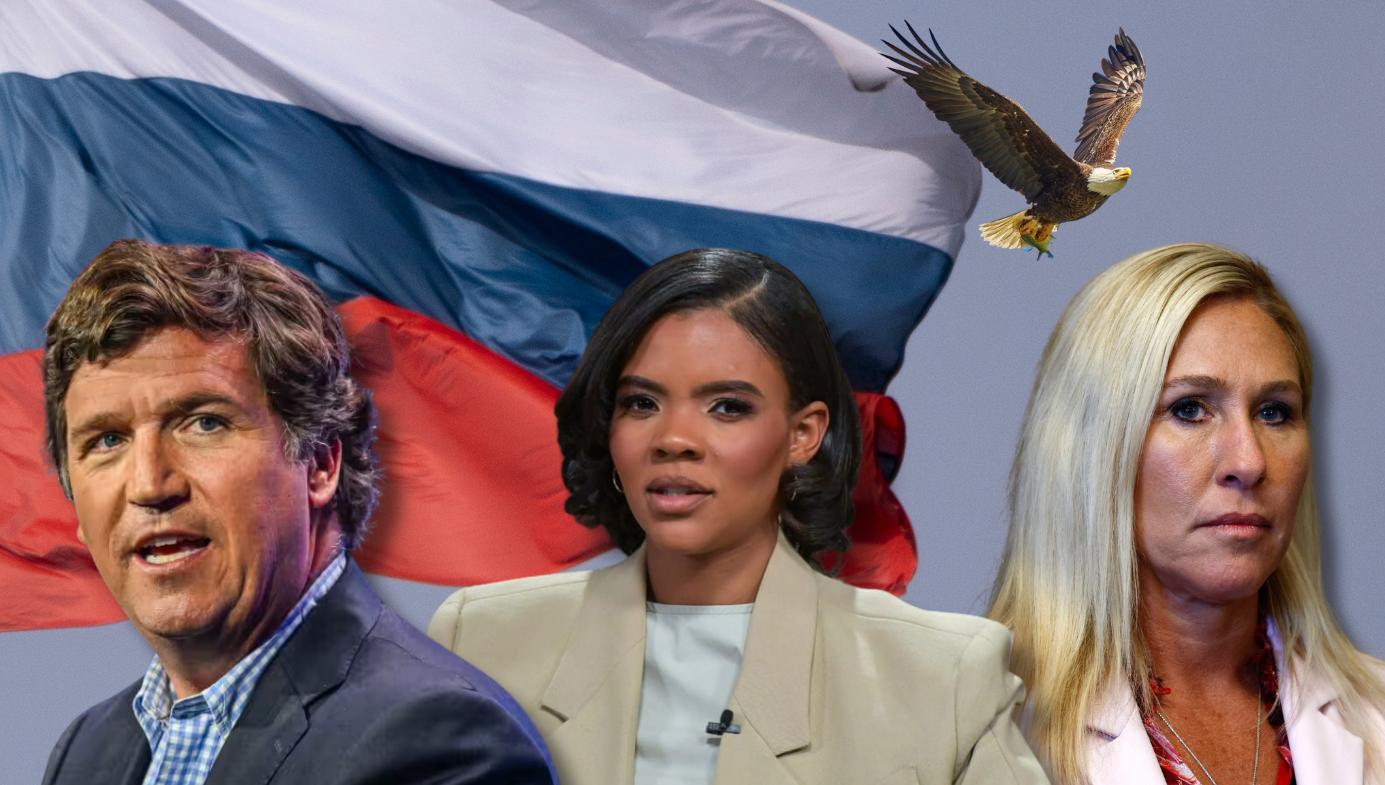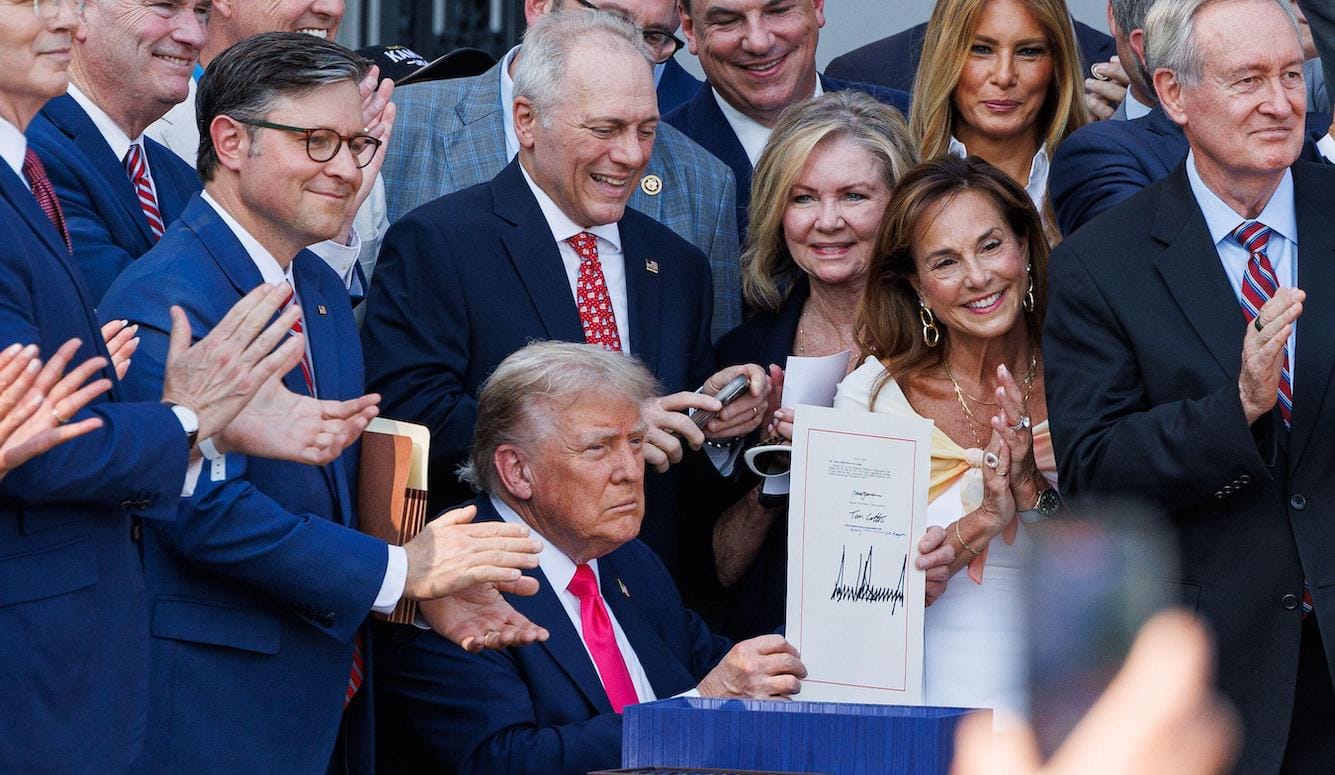Politics
Nationalist Self-Hatred
The culture war alone cannot explain the civic rot on the populist Right.

I.
Two days before the war in Ukraine officially began, Russian President Vladimir Putin recognized the “independence” of Luhansk and Donetsk—parts of the Donbas in eastern Ukraine that Russia had already carved off and occupied. Donald Trump described the seizure and recognition of these regions as “genius”: “So, Putin is now saying, ‘It’s independent,’ a large section of Ukraine. I said, ‘How smart is that?’” Trump also described the invading Russian army as the “strongest peace force,” and at a fundraiser the next day, he said, “I mean, he’s taking over a country for two dollars worth of sanctions. I’d say that’s pretty smart.”
One of Trump’s favorite rhetorical tactics is the insistence that the United States’ authoritarian adversaries are run by brilliant strategic thinkers like Putin, Xi Jinping, and Kim Jong Un, while its own leaders are buffoons who are constantly being manipulated and outmaneuvered. But Trump goes beyond claims about competence and incompetence. “The greatest threat to Western civilization today is not Russia,” he declared last year. “It’s probably, more than anything else, ourselves.”
This sort of observation has become commonplace on the Trumpist Right. On the same day that Trump lauded Putin’s “savvy” decision to recognize the Ukrainian territories he had stolen, Candace Owens said: “NATO (under direction from the United States) is violating previous agreements and expanding eastward. WE are at fault.” A month later, Georgia Rep. Marjorie Taylor Greene claimed that “NATO has been supplying the neo-Nazis in Ukraine with powerful weapons and extensive training on how to use them.” Arizona Rep. Paul Gosar declared: “Ukraine is not our ally. Russia is not our enemy. We need to address our crippling debt, inflation and immigration problems. None of this is Putin’s fault.”
After Tucker Carlson conducted an obsequious interview with Putin last month, he wandered around Moscow marveling at the subway station, a supermarket, and other signs of civilizational triumph. When he discovered how cheap the groceries were, he reported that the shock “radicalized” him, and that it should have the same effect on all Americans: “Coming to a Russian grocery store, the heart of evil, and seeing what things cost and how people live, it will radicalize you against our leaders.” He didn’t bother to mention that GDP per capita in the United States is over six times higher than it is in Russia.
TC Shorts: The Moscow Subway Station pic.twitter.com/xX8qRrda3X
— Tucker Carlson (@TuckerCarlson) February 14, 2024
Carlson’s propaganda tour was met with well-deserved outrage and derision in the American media. “The difference between our urinal-caked, chaotic subways and your candelabra’d, beautiful subways,” Jon Stewart observed, “is the literal price of freedom.” North Carolina Sen. Thom Tillis said, “The Soviets had a term for people like Tucker: useful idiots.” The historian Anne Applebaum explained that Carlson “follows in a long tradition” of conservatives “who admire Russia because they don’t understand it, and because they hate their own country.”
Wrote this in 2019, about the American conservatives who admire Russia because they don't understand it, and because they hate their own country. Tucker Carlson follows in a long tradition: https://t.co/46AeN8tAfF
— Anne Applebaum (@anneapplebaum) February 12, 2024
Many of Carlson’s most vehement critics disagree with Tillis’s characterization—he’s no “useful idiot,” they say, because he knows exactly what he’s doing. After observing how Carlson’s broadcast from Moscow concealed the truth about Putin’s brutal autocracy, misunderstood basic economics, etc., Stewart continued: “But here’s the reality: you fucking know all this.” He argued that Carlson’s dispatches from Moscow reflected the shifting terrain of global ideological struggle: “The old civilizational battle was communism versus capitalism. That’s what drove the world since World War II—Russia was the enemy then. But now, they [populist conservatives] think the battle is woke versus unwoke, and in that fight, Putin is an ally to the Right.”
It’s true that Carlson’s pro-Russia propaganda can be partly understood in the context of the culture war. American conservatives have long been attracted to Putin for his cynical embrace of “traditional values” and the Russian Orthodox Church, and his insistence that he’s the defender of Christian civilization against the encroaching tide of wokeness and Western decadence.
When Putin compared cancel culture to Bolshevism in a 2021 address, there was a frenzy of adulation in the conservative media—the Daily Wire published excerpts from the speech, Rod Dreher wrote an essay in which he declared that Putin was “completely correct on the society-destroying nature of wokeness and postliberal leftism,” and so on. Right-wing pundits and politicians have a strange habit of fawning over Russian military recruitment ads, while conservative intellectuals like Jordan Peterson regard Putin as an ally in the grand civilizational battle against wokeness.
But there’s something else happening on the nationalist, pro-Russia right. Anti-wokeness doesn’t tell us why Carlson would actually prefer a Russian victory in Ukraine. There’s no natural link between opposition to DEI, critical race theory, or gender neutral bathrooms and the Ukrainian conflict. The culture war isn’t enough to explain Carlson’s constant lectures about America’s malign role in the world—which he has been delivering since he was the star pundit at Fox News—or his conspiracism about the shadowy forces plotting to destroy the United States from within. There’s something more fundamental at work among members of the populist Right, where contempt for the defining features of their own societies has become ubiquitous.
So it’s unanimous: everyone in power, from the White House, to the hedge fund managers, to the Supreme Court of the United States has decided to destroy the country by allowing it to be invaded. That leaves the population to defend itself. Where are the men of Texas? Why aren’t…
— Tucker Carlson (@TuckerCarlson) January 23, 2024
The populist Right may identify with Putin’s opposition to cancel culture and applaud when he declares that the woke Left is more authoritarian than the Soviet Union, but this can’t account for the enmity they display toward their own country, its democratic allies, and the threatened democracies (particularly Ukraine) that it supports. The infatuation with the culture war is just one aspect of this civic rot, which is becoming deeper and more widespread all the time.





